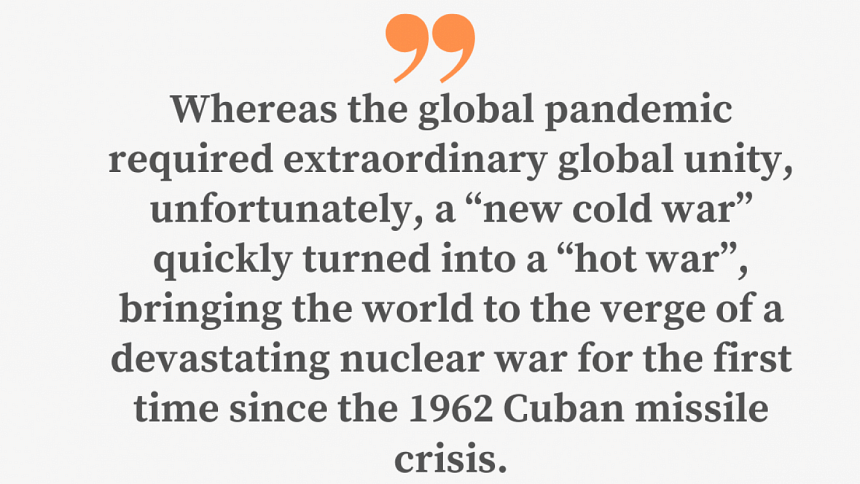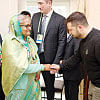Living another year dangerously

2022 has been a year of great uncertainty when it seemed the world perilously reached the brink of self-destruction – be it human-induced climate change or military conflict. Welcoming 2022, we had enough reasons to be optimistic; but it was another "year of living dangerously" – Tahun vivere pericoloso in the words of Soekarno, or an annus horribilis in the words of the late Queen Elizabeth.
No end to Covid-19
The joy of the Covid vaccine discovery quickly vanished as the "vaccine apartheid" blatantly prioritised lives in rich nations, especially of the wealthy, over the "wretched of the earth", and corporate profit triumphed over people's lives. Meanwhile, Dr Anthony Fauci's sober warning of a more dangerous Covid variant emerging this winter may come to be true as China, the country of 1.4 billion, struggles to deal with the surge in cases since it has largely abandoned its unpopular "zero Covid" policy.
New cold war turns into proxy war
Whereas the global pandemic required extraordinary global unity, unfortunately, a "new cold war" quickly turned into a "hot war", bringing the world to the verge of a devastating nuclear war for the first time since the 1962 Cuban missile crisis. Russia, finding itself cornered by an expanding NATO, decided most foolishly to invade Ukraine, believing it could overrun the country without any resistance. While the heroic Ukrainians continue to defend their motherland, Russia seems to have become bogged down in a proxy war with NATO.
If the proxy war with Russia was not enough, the US is recklessly provoking China towards another "hot war", following Trump's trade war. Clearly the monopoly capital of the US and its military-industrial complex are pushing the US to a "Thucydides Trap." More than 60 years ago, President Eisenhower, in his farewell address to the nation, warned about the military-industrial complex, a formidable union of defence contractors and the armed forces. Eisenhower, a retired five-star Army general, who led the allies on D-Day, saw the military-industrial complex as a threat to democratic government and global peace. Alas, his dire warning fell on deaf ears.

Western hypocrisy exposed
The Russian invasion of Ukraine exposed Western pretence. The Western mainstream media unashamedly declared the dislocation of Ukrainians intolerable because the victims are blue-eyed, blond-haired Europeans, not "uncivilised" third world inhabitants or "barbaric" Arabs. Western duplicity is nowhere as blatant as it is in the case of the Palestinian plight. To them, Russia's occupation and annexation of parts of Ukraine is illegal; but Israel's occupation and annexation of Palestinian land as well as gross human rights violations are justified on various professed grounds, e.g., right to protection from "terrorist acts."
Leadership vacuum
The world now needs Eisenhower to resist the military-industrial complex; it needs Teddy Roosevelt to break monopoly capital's stranglehold and to protect consumers, workers and the environment; it needs Franklin Roosevelt to promote multilateralism and social justice; it needs Kennedy to defuse crises. At the height of the "old cold war," Kennedy ate humble pie by quietly removing the security threat to the USSR posed by offensive weapons (Jupiter MRBMs) deployed in Turkey, and publicly pledging that the US would never invade Cuba or attempt another Bay of Pigs operation. Eisenhower was magnanimous enough to bear the lion's share of financing the USSR's proposal for global efforts to eradicate smallpox – the leading cause of death and blindness then.
Alas, we see no such signs in a world of Trump, Biden, Johnson, Marcon and Scholz. Even "out of touch," billionaire Sunak does not inspire any hope, despite being the first coloured person of colonial descent to occupy the 10 Downing Street. Sunak will probably try to prove himself holier than the Pope, instead of promoting the interest of former colonies or descendants of colonial subjects or downtrodden.
No better leadership in the South
The South is also devoid of visionaries, such as Nkrumah or Nehru who promoted non-alignment and Southern unity. Nehru's land is now overtaken by Modi's Hindutva movement, openly promoting violence against minorities. Unsurprisingly, Modi was in sync with Trump; but he equally cosies up to Biden professing to promote democracy and human rights. Sadly, Mandela's South Africa is mired in scandal after scandal.
Although many, including myself, eagerly looked forward to Lula's victory in Brazil, neither his return to power nor the so-called "second pink tide" in Latin America should make one overly joyous. The Left has demonstrated its propensity to fracture or implode easily, e.g., contributing to Correa's defeat in Ecuador, or aiding the Right to strike back in Peru. In Colombia, finance capital, mining giants and the elite have already ganged up on Petro's vow to tackle inequality with tax and land reforms and his proposed ban on new oil and gas exploration. Chile's Boric has faced setbacks including the rejection of a new constitution, forcing his concessions to the Centre-Right. Constitutional coup is a common strategy of the established vested interest.
Some inspirations down under
Down under, the Australians soundly defeated an increasingly autocratic and unaccountable conservative government in May. It was the government that implemented inhumane off-shore detention centres for people seeking to escape persecution and starvation in their own countries (about to be emulated by the UK Tory government). It also was cruel enough to pursue vulnerable people on social security payments with a robotic programme whilst cutting taxes for the wealthy and letting them evade tax. It was the government which created plumb jobs for the boys. It was the government which continued to deny climate science and refused to act.
Finally, the Australians got rid of it. Labour showed extraordinary discipline in opposition, and in government, it stood up to big business and vested interests. It has quickly moved to put in place the processes to: i) set up an independent anti-corruption body with real teeth; ii) recognise the voice of First Nations people; iii) respect human rights of asylum seekers languishing in detention centres; iv) address environmental degradation and achieve 43 percent emissions reduction target by 2030; v) restore labour rights, fair and decent wages; vi) review RBA's performance to ensure monetary policy serves broader national interest, not the finance; and vii) balance geo-political alliances.
Its progressive agenda is quite long. Let me end here, wishing the Australian Labour government success to inspire other nations – large and small, developed and developing; and with best wishes for you to be safe and remain healthy, even if not quite bright-eyed and bushy-tailed.
Anis Chowdhury is adjunct professor at Western Sydney University and the University of New South Wales, Australia.
Copyright: Inter Press Service

 For all latest news, follow The Daily Star's Google News channel.
For all latest news, follow The Daily Star's Google News channel. 










Comments